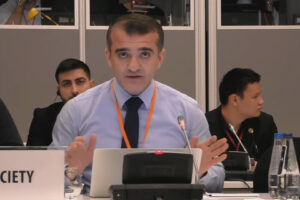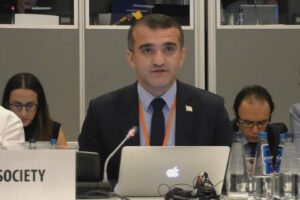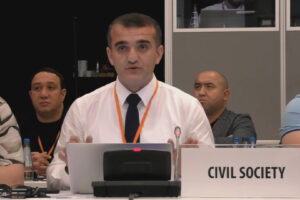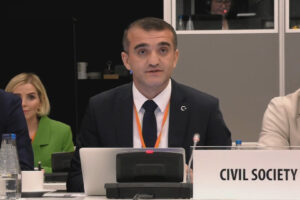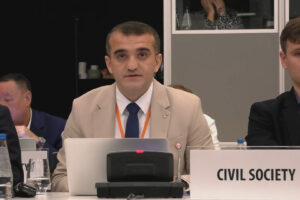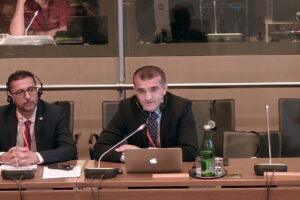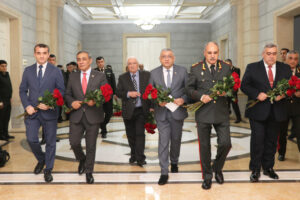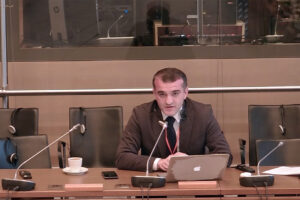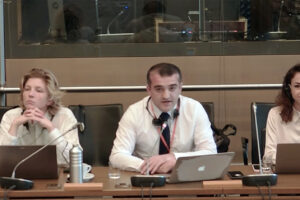“Azerbaijan is moving in the wrong direction,” Helsinki Commission hearing urged Baku to refrain from further repressions


The US Congressional Commission on Security and Cooperation in Europe, known as the Helsinki Commission, on Wednesday, June 11, strongly urged the Azerbaijani government to fulfill its obligations on human rights and greater democracy, instead of heading further towards authoritarianism:
“We consider Azerbaijan an important friend and partner in the region and that means we care deeply about its development:” Senator Benjamin Cardin, a Maryland Democrat and chairman of the Helsinki Commission, stated during the special hearing on “the Security, Economic and Human rights Dimensions of US-Azerbaijani relations.”
While both countries have “much to celebrate” over their history of strategic cooperation, Washington also has significant concerns regarding Azerbaijan’s domestic political situation, which, as Senator Cardin put it, “is troubling because Azerbaijan is moving in the wrong direction.”
Along with the consistently seen problems with freedom of the media and association, last two years have marked a high number of arrests and convictions of activists that had all bean the hallmark signs politically motivated prosecutions, the senator said.
“Our concern is…” he added, “that rather than working to live up to its commitments in the OSCE and the CoE, Azerbaijan is instead heading towards greater authoritarianism: We want to work with Azerbaijan to change this trend”.
“The US needs a stable and prosperous Azerbaijan; But absent real democratic progress, we will not see true stability and development,” he emphasized.
The hearing, which the Azerbaijani Ambassador to the US refused to attend bringing a reason that he had “other meetings on the security front wit the representatives of the US”, meant to invite Baku to keep the door open for talks, ahead of top Congressional delegation’s trip to the country at the end of this month, where it will attend both the OSCE PA Annual Session and have bilateral meetings with the leadership. (It wasn’t immediately clear where and who the Ambassador was at a meeting with…)
Speaking before the commission Deputy Assistant Secretary of State Thomas Melia, who has been refused to enter Azerbaijan last September, ahead of the presidential election, underlined the importance of the democracy dialogs between the two countries, saying that he “would like to visit Azerbaijan again soon to continue these conversations..”
“While serving as Deputy Assistant Secretary of State, I have visited Azerbaijan three times, holding valuable meetings with leading government officials, including President IlhamAliyev, as well as with opposition political leaders, civil society actors, and journalists…. I believe these are important opportunities to listen to Azerbaijanis inside and outside of government, to share with them our thoughts, and to demonstrate that we do care about all three dimensions of the relationship,” he said.
In the meantime, according to the State Department official, the situation of civil liberties in Azerbaijan has steadily worsened over the past five years and continue to deteriorate.
In 2009, it was already difficult for advocates of democratic reform – especially opposition political parties – to participate in the political life of the country, but it was still possible for NGOs and independent activists to operate.
Sadly, said Melia, the environment has worsened significantly since then while the suppression of peaceful dissent increased in 2011, with the arrests of young Azerbaijani activists who sought to organize peaceful pro-democracy rallies in Baku.
Since early 2013, the space for peaceful dissents has narrowed more dramatically, and the exercise of fundamental freedoms has become still more tenuous. A number of leading peaceful democracy advocates, civil society activists, and journalists have been incarcerated, including presidential candidate and chairman of the democratic reform-oriented REAL Movement, IlgarMammadov; opposition journalist and Musavat Party Deputy Chairman TofigYagublu; members of democratic youth movements; blogger Abdul Abilov; religious scholar and activist TalehBagirzade; Khural Editor AvazZeynalli; and the chairman of NDI’s local election monitoring partner, the Election Monitoring and Democracy Studies Center, AnarMammadli.
“Restrictions on the ability of selected Azerbaijani activists to travel outside of the country are also a problem, calling into question the extent of the government’s commitment to freedom of movement, a founding tenet of the OSCE,” Melia said, arguing, that since 2006, the government has prevented the foreign travel of opposition Popular Front Party Chairman Ali Karimli by refusing to renew his passport.
“Today in Bern, the OSCE’s Office for Democratic Institutions and Human Rights is discussing the important role of human rights defenders in OSCE participating States. Sadly, one of Azerbaijan’s leading human rights defenders, LeylaYunus, was unable to attend the event, because Azerbaijan’s authorities confiscated her passport – as well as her husband’s – in April. This confiscation occurred in the context of the April 19 arrest of well-known journalist RaufMirkadirov, the subsequent questioning of LeylaYunus and her husband about Mirkadirov, and their poor treatment by police authorities. All three have been strong proponents of people-to-people diplomacy, which helps build ties between Azerbaijanis and Armenians and is crucial to the peaceful resolution of the Nagorno-Karabakh conflict.”
For Melia, the peaceful resolution of this conflict will open borders, increase security, and create new opportunities to trade, travel, and engage across the region. Authorities also have prevented some in the international human rights community from visiting or returning to Azerbaijan.
In his testimony Eric Rubin, deputy assistant secretary of state in the Bureau of European and Eurasian Affairs, noted that on Karabakh peace process resolution concept remain “same as when negotiations began”. The US wants “progress this year,” he added.
Rubin also underscored Azerbaijan’s positive security and energy cooperation with the west, adding, however, that US’s strongest relationships across the globe are with democracies that respect the full range of human rights of their citizens.
Calling Baku’s democracy enforcement “highly selective and superficial”, another speaker, Dr. Miriam Lanskoy, director for Russia and Eurasia, National Endowment for Democracy, emphasized that the oil-reach country leadership “changes the subject” of human rights to divert attention away, “no follow through” on commitments to OSCE.
Ironically, she said, “though Azerbaijan is not in compliance with basic norms of human rights, freedom of speech and association that are fundamental part of its OSCE obligations, it is about to host the OSCE PA at the end of the month”.
Despite participation in these international forums, over the last decade freedoms in Azerbaijan has declined substantially. Overall, the country has gone from semi-free to state of consolidated authoritarianism.
For Lanskoy, recent events in Ukraine have major implications for Azerbaijan, and are seen as part of the reason that the crackdown on government critics has continued.
The climate has also become much more difficult for the NGOs. February 2013 amendments to the NGO law increases existing sanctions against unregistered NGO activity.
“It became illegal for unregistered groups to receive grants or donations. In conjunction with arbitrary refusal of registration, this places civic activists in an impossible position. The amendments also dramatically increase penalties for any NGO that does not register its grants,” she said. “Another set of amendments that extends onerous requirements to international organizations was passed in February 2014. Grantees report months of effort with arbitrary bureaucracy to register their grants that are so far inconclusive. There is considerable apprehension that the regulations will be selectively enforced against organizations that are critical of the government.”
However even prior to these amendments, Azerbaijan was seen as violating freedom of association due to overregulation of NGOs.
For Lanskoy, Azerbaijan should be bringing its legislation in compliance with ECHR and Venice Commission opinions rather than imposing even greater burdens on NGOs.
Melia,in his part, added while Washington recognizes Azerbaijan’s seeking stability in a very difficult neighborhood, and it supports Azerbaijan’s long-term stability, security, and prosperity, the “best way to guarantee such a future is to strengthen democratic processes and institutions to buttress respect for the rule of law and fundamental freedoms.”
” Doing so will foster long-term internal stability, create the most inviting environment for economic investment and growth, and make Azerbaijan the very best that it can be, by giving every citizen the freedom and space to achieve his or her full potential, thereby maximizing the contributions of all of its people. We consider this to be in both the short-term and the long-term interests of both the people and the government of Azerbaijan,” he emphasized.
A.Raufoglu
Washington, DC
“Azerbaijan is moving in the wrong direction,” Helsinki Commission hearing urged Baku to refrain from further repressions
 12 June 2014
12 June 2014

The US Congressional Commission on Security and Cooperation in Europe, known as the Helsinki Commission, on Wednesday, June 11, strongly urged the Azerbaijani government to fulfill its obligations on human rights and greater democracy, instead of heading further towards authoritarianism:
“We consider Azerbaijan an important friend and partner in the region and that means we care deeply about its development:” Senator Benjamin Cardin, a Maryland Democrat and chairman of the Helsinki Commission, stated during the special hearing on “the Security, Economic and Human rights Dimensions of US-Azerbaijani relations.”
While both countries have “much to celebrate” over their history of strategic cooperation, Washington also has significant concerns regarding Azerbaijan’s domestic political situation, which, as Senator Cardin put it, “is troubling because Azerbaijan is moving in the wrong direction.”
Along with the consistently seen problems with freedom of the media and association, last two years have marked a high number of arrests and convictions of activists that had all bean the hallmark signs politically motivated prosecutions, the senator said.
“Our concern is…” he added, “that rather than working to live up to its commitments in the OSCE and the CoE, Azerbaijan is instead heading towards greater authoritarianism: We want to work with Azerbaijan to change this trend”.
“The US needs a stable and prosperous Azerbaijan; But absent real democratic progress, we will not see true stability and development,” he emphasized.
The hearing, which the Azerbaijani Ambassador to the US refused to attend bringing a reason that he had “other meetings on the security front wit the representatives of the US”, meant to invite Baku to keep the door open for talks, ahead of top Congressional delegation’s trip to the country at the end of this month, where it will attend both the OSCE PA Annual Session and have bilateral meetings with the leadership. (It wasn’t immediately clear where and who the Ambassador was at a meeting with…)
Speaking before the commission Deputy Assistant Secretary of State Thomas Melia, who has been refused to enter Azerbaijan last September, ahead of the presidential election, underlined the importance of the democracy dialogs between the two countries, saying that he “would like to visit Azerbaijan again soon to continue these conversations..”
“While serving as Deputy Assistant Secretary of State, I have visited Azerbaijan three times, holding valuable meetings with leading government officials, including President IlhamAliyev, as well as with opposition political leaders, civil society actors, and journalists…. I believe these are important opportunities to listen to Azerbaijanis inside and outside of government, to share with them our thoughts, and to demonstrate that we do care about all three dimensions of the relationship,” he said.
In the meantime, according to the State Department official, the situation of civil liberties in Azerbaijan has steadily worsened over the past five years and continue to deteriorate.
In 2009, it was already difficult for advocates of democratic reform – especially opposition political parties – to participate in the political life of the country, but it was still possible for NGOs and independent activists to operate.
Sadly, said Melia, the environment has worsened significantly since then while the suppression of peaceful dissent increased in 2011, with the arrests of young Azerbaijani activists who sought to organize peaceful pro-democracy rallies in Baku.
Since early 2013, the space for peaceful dissents has narrowed more dramatically, and the exercise of fundamental freedoms has become still more tenuous. A number of leading peaceful democracy advocates, civil society activists, and journalists have been incarcerated, including presidential candidate and chairman of the democratic reform-oriented REAL Movement, IlgarMammadov; opposition journalist and Musavat Party Deputy Chairman TofigYagublu; members of democratic youth movements; blogger Abdul Abilov; religious scholar and activist TalehBagirzade; Khural Editor AvazZeynalli; and the chairman of NDI’s local election monitoring partner, the Election Monitoring and Democracy Studies Center, AnarMammadli.
“Restrictions on the ability of selected Azerbaijani activists to travel outside of the country are also a problem, calling into question the extent of the government’s commitment to freedom of movement, a founding tenet of the OSCE,” Melia said, arguing, that since 2006, the government has prevented the foreign travel of opposition Popular Front Party Chairman Ali Karimli by refusing to renew his passport.
“Today in Bern, the OSCE’s Office for Democratic Institutions and Human Rights is discussing the important role of human rights defenders in OSCE participating States. Sadly, one of Azerbaijan’s leading human rights defenders, LeylaYunus, was unable to attend the event, because Azerbaijan’s authorities confiscated her passport – as well as her husband’s – in April. This confiscation occurred in the context of the April 19 arrest of well-known journalist RaufMirkadirov, the subsequent questioning of LeylaYunus and her husband about Mirkadirov, and their poor treatment by police authorities. All three have been strong proponents of people-to-people diplomacy, which helps build ties between Azerbaijanis and Armenians and is crucial to the peaceful resolution of the Nagorno-Karabakh conflict.”
For Melia, the peaceful resolution of this conflict will open borders, increase security, and create new opportunities to trade, travel, and engage across the region. Authorities also have prevented some in the international human rights community from visiting or returning to Azerbaijan.
In his testimony Eric Rubin, deputy assistant secretary of state in the Bureau of European and Eurasian Affairs, noted that on Karabakh peace process resolution concept remain “same as when negotiations began”. The US wants “progress this year,” he added.
Rubin also underscored Azerbaijan’s positive security and energy cooperation with the west, adding, however, that US’s strongest relationships across the globe are with democracies that respect the full range of human rights of their citizens.
Calling Baku’s democracy enforcement “highly selective and superficial”, another speaker, Dr. Miriam Lanskoy, director for Russia and Eurasia, National Endowment for Democracy, emphasized that the oil-reach country leadership “changes the subject” of human rights to divert attention away, “no follow through” on commitments to OSCE.
Ironically, she said, “though Azerbaijan is not in compliance with basic norms of human rights, freedom of speech and association that are fundamental part of its OSCE obligations, it is about to host the OSCE PA at the end of the month”.
Despite participation in these international forums, over the last decade freedoms in Azerbaijan has declined substantially. Overall, the country has gone from semi-free to state of consolidated authoritarianism.
For Lanskoy, recent events in Ukraine have major implications for Azerbaijan, and are seen as part of the reason that the crackdown on government critics has continued.
The climate has also become much more difficult for the NGOs. February 2013 amendments to the NGO law increases existing sanctions against unregistered NGO activity.
“It became illegal for unregistered groups to receive grants or donations. In conjunction with arbitrary refusal of registration, this places civic activists in an impossible position. The amendments also dramatically increase penalties for any NGO that does not register its grants,” she said. “Another set of amendments that extends onerous requirements to international organizations was passed in February 2014. Grantees report months of effort with arbitrary bureaucracy to register their grants that are so far inconclusive. There is considerable apprehension that the regulations will be selectively enforced against organizations that are critical of the government.”
However even prior to these amendments, Azerbaijan was seen as violating freedom of association due to overregulation of NGOs.
For Lanskoy, Azerbaijan should be bringing its legislation in compliance with ECHR and Venice Commission opinions rather than imposing even greater burdens on NGOs.
Melia,in his part, added while Washington recognizes Azerbaijan’s seeking stability in a very difficult neighborhood, and it supports Azerbaijan’s long-term stability, security, and prosperity, the “best way to guarantee such a future is to strengthen democratic processes and institutions to buttress respect for the rule of law and fundamental freedoms.”
” Doing so will foster long-term internal stability, create the most inviting environment for economic investment and growth, and make Azerbaijan the very best that it can be, by giving every citizen the freedom and space to achieve his or her full potential, thereby maximizing the contributions of all of its people. We consider this to be in both the short-term and the long-term interests of both the people and the government of Azerbaijan,” he emphasized.
A.Raufoglu
Washington, DC
 @
@










